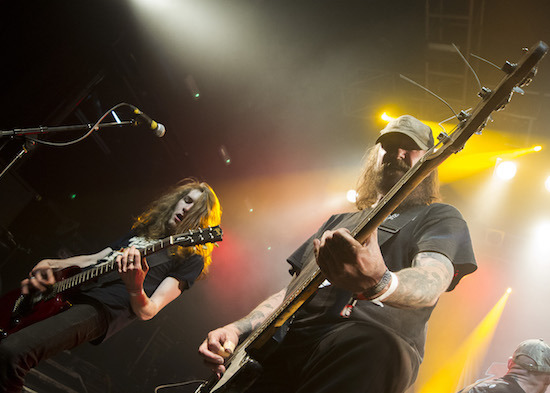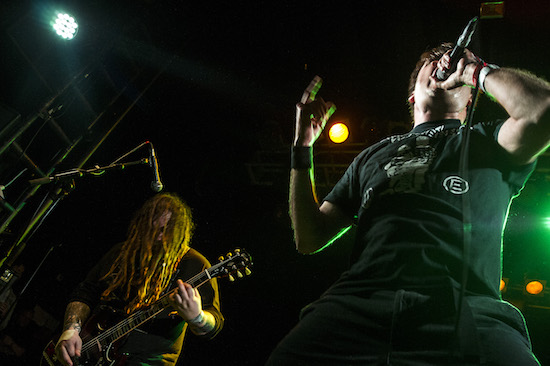Napalm Death photo by Lola Vincent
“For this festival we tried to get in the spirit by doing as many slow songs as possible,” says Barney Greenway of Napalm Death, about a quarter of the way through a set not conspicuous by its sloth. “I’ll be honest with you, we found it quite difficult.”
There are a few caveats, or footnotes, to this confession by grindcore’s most recognisable frontman. Firstly, Napalm tried this before in 2014, at Netherlands festival Roadburn – a slightly more leftfield continental peer of Desertfest – and reports seemed to indicate that the audience, lumbering doomsters or no, would have preferred a regular set of hyperspeed classics. Secondly, the bands playing this weekender’s opening day (easily the best of its three, for my money) vary greatly, stylistically and in their BPM. When Desertfest started in 2012, it leant more heavily on the midtempo, post-Kyuss stoner aesthetic, but it’s diversified year on year to leave little on its 2018 bill that evokes dustbowls and cacti.
Thirdly, the popular image of Napalm Death as progenitors of grind – the insanely fast band who invented the insanely fast metal genre – is itself a bit knottier than that. Mick Harris, the group’s drummer for their first two LPs and general musical polymath, informally coined the term to denote, essentially, extremes of tempo: from Swans’ mid-1980s releases to the Swedish, Dutch and American hardcore of the same period, which the tape-trading Napalm members first appropriated, then outstripped. By the end of the decade, they were both a seriously popular force in metal, and a sort of meme-y joke among non-metallers with their one-second songs and kids’ TV guest spots. Their entry in The Guinness Who’s Who Of Indie And New Wave Music, a book which I acquired in my early teens and whose choices for inclusion are largely baffling in retrospect, notes of pre-Greenway vocalist Lee Dorrian: “The lyrics deal with social and political injustices, but mostly sound like somebody coughing up blood.”
Which seems very prissy now, given developments in extreme music in the three decades since Napalm’s debut Scum, but gives an instructive example of changes in perceptions of what is considered extreme. Or possible. Or even acceptable. Black Sabbath’s position in the rock canon is now unquestioned, but only thanks to the group shrugging off years of derisory reviews in Rolling Stone and the like, failing to comprehend why a band would want to sound this slow, downtuned and Neanderthal. Thus were laid the foundations for doom metal, a movement defined by its defiant plod – bands taking Sabbath’s blueprint and, of course, making it slower. Without it, this year’s Desertfest would be very different.
The two most significant doom outfits on Friday’s bill (across the whole weekend, in fact) might both take amused succour in this music now being popular enough to be placed high up running orders in balconied Camden halls. The Obsessed, whose roots date back to the 1970s, is grizzled frontman Scott ‘Wino’ Weinrich plus recent, younger recruits; Wino has weathered the long period across the 1980s and 90s when this music was extremely uncool and near-unsellable. That, and an epic meth dependency that got him banged up and banned from Europe for a while. A Maryland institution inspired by biker rock and psych as well as Sabbath, and adjacent to the region’s hardcore and metal scenes in the early 80s, The Obsessed are a band I assumed I’d never get to see, so it’s thrilling to encounter a full Koko and a splendid set of rumbling heaviness characterised by Wino’s godhead guitar tone and topped off with a rendition of one of his earliest, most sinister songs, ‘Sodden Jackal’.
Later that evening, Warning play to an Electric Ballroom which is half-full at best – this still representing a sizeable increase of audience since their first incarnation. The second and, to date, final album by the British three-piece, 2006’s Watching From A Distance, was an instant classic among doom lifers but made little apparent impact among the kind of genre dabblers who were getting their heads turned by Southern Lord’s release schedule around this time. (Here’s a flyer I found from this era, promoting a Warning headline set at a tiny punk boozer in Bristol.) Understandable: this is snow-pure doom metal which blossoms with a dignified funereality, as Patrick Walker enunciates each syllable with painful clarity and lets every guitar chord hang in the air. To immerse yourself in Watching… – or this set, which consists of its five songs played in order – is to retreat into a world cured of irony poisoning and reliance on shock tactics. Walker, by way of an intro to ‘Faces’, directly compares Warning to one of his favourite musicians, Leonard Cohen, and in no way comes off as hubristic. Say what you will of Len, but none of his songs feature one of the five best doom riffs ever, like ‘Faces’ does.

Zeke photo by Lola Vincent
And yet for all that, and with a day’s worth of reflection, my Desertfest highlight was the ludicrous early evening performance of Zeke, a band who stand in virtual diametric opposition to Warning. Like Warning, Zeke have recently returned to the fray after coming to a halt at some point in the previous decade; unlike Warning, they are foul-mouthed shitheads from Seattle who play at least 30 songs in 45 minutes with astonishing exactitude and a blizzarding pandemonium that feels like your head’s being set on fire. I saw them a couple of times in the early part of the century and it was mental, and I think the only time I’ve been in a fight at a gig. Seventeen years later, with a mostly altered lineup and a new album titled Hellbender, things are pretty much the same, only with no fighting and a setting (Koko again) which allows one to appreciate what amazingly on-point performers Zeke are.
Typically, it goes like this: a song is banged out at thrash metal speed, allows for recourse to a sleaze-rock guitar solo, features twin-vocal interplay reminiscent of classic rap (I’m quite serious about this, even while strongly doubting Zeke are wilfully channelling it) and concludes in under two minutes like the best hardcore punk. Then they raise their guitars vertically above their heads, pause for approximately two seconds and do they same thing again. Guitarist Blind Marky Felchtone (that’s Blind Marky Felchtone) uses the sole extended interlude to observe, Archie Bunkerishly, “We’ve been on tour for a month and a half and nobody speaks fuckin’ English!” I can’t claim to know how much Zeke’s trucker-hatted pool-ball-in-a-sock belligerence is a put-on in 2018 – anecdotal lore has it that back in the day, they were the authentic tweaked-out self-destructive deal – but I can say that their performance was like watching Slayer, Poison Idea, D.R.I., Run DMC and Kiss (whose ‘Shout It Out Loud’ they cover) trying to keep up with a gabber DJ.
Zeke’s wives and girlfriends (I’m assuming), visible stageside at the end, constitute almost as many women as the weekend’s actual lineup in its entirety. To listen to doom and sludge and the like as a would-be progressive rock fan, as it were, involves a lot of pitting ideals against instincts, or plain ol’ cognitive dissonance. It’s a failure of something, likely structural and institutional rather than with Desertfest specifically, that a gathering of several dozen bands can be a near clean sweep of dudes (a hefty majority white, for good measure). The counter argument, that Desertfest will struggle to do much to change this while focusing on the music it does, actually feels less persuasive than my instinctive one of ‘These jams just fucking rule.’
Desertfest feels like a festival being done in ultimately noble spirit, and reaching good people: notwithstanding any issues onstage, the crowd doesn’t feel overwhelmingly male (others might both feel differently and be more entitled to those feelings) and there’s no overt dickhead behaviour in my eyeline. The Black Heart, a rock pub down a side street where The Quietus are hosting bands today, involves a lot of queueing if you want to catch anyone – I only manage Casual Nun circa late afternoon, who are their usual full-tilt freak-psych excellent self – but you can get a pint of Beavertown in there for a fiver which, I regret to inform Northern ale-suppers, is good value these days. Walking towards it also drowns out the tit busking ‘Champagne Supernova’ through a practice amp on the pavement, and anything else that represents the worst of Camden.
Late night on a Friday, Napalm Death certainly feel like a better shout than Oasis for People’s Band Status. "You can stay in the pit, we don’t do that three songs bullshit," says Barney, hopefully addressing the photographers and not me writing this review. One of his most agreeable traits is how he’s never really come to terms with playing to huge crowds – not that he’s meek or retiring, goodness no, but as the rest of Napalm blast and grind clinically, the vocalist is an unchoreographed tangle of balled fists and gurns. ‘Dear Slum Landlord’ and ‘Persona Non Grata’ come the closest to being ‘slow ones’, but my – and, I imagine, the band’s – suspicion that the crowd want warp speed is upheld with the response to ‘Scum’, ‘Life?’, ‘Standardisation’, a raging ‘Suffer The Children’ and a cover of Anti-Cimex’s ‘Victims Of A Bomb Raid’. An enduring classic of early Swedish hardcore, its presence here is Napalm Death’s way of honouring their formative influences: bands determined to break the upper limits of speed and abrasiveness. And if pursuit of musical extremes has historically been a male preserve, like growing the hottest chilli or biggest pumpkin, down the line the results can prove strangely inclusive.


